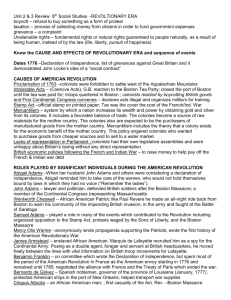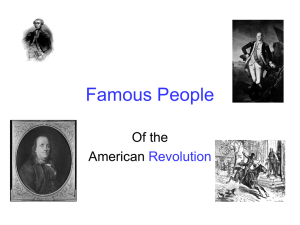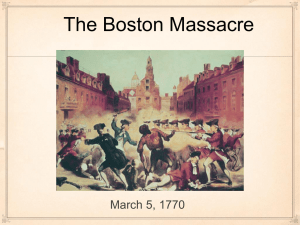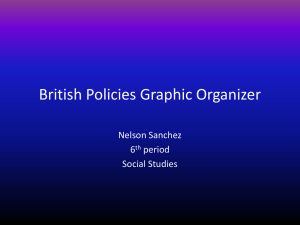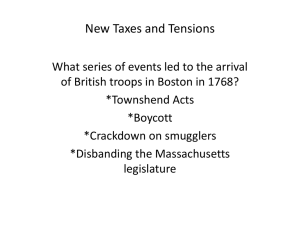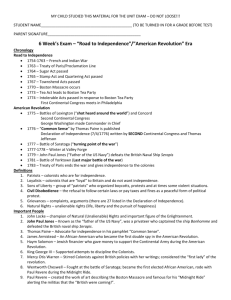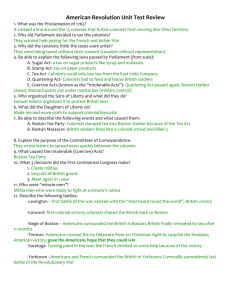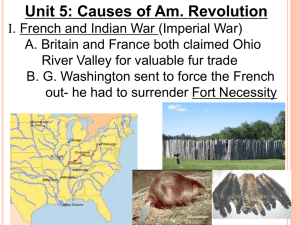American Revolution Unit Test Review
advertisement
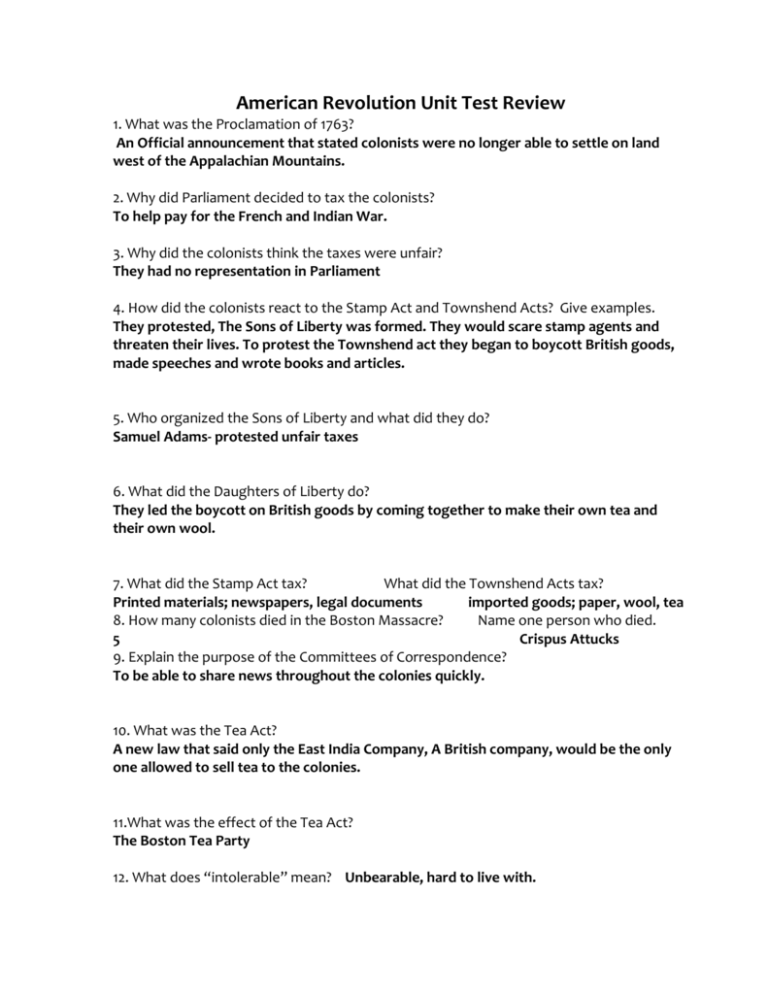
American Revolution Unit Test Review 1. What was the Proclamation of 1763? An Official announcement that stated colonists were no longer able to settle on land west of the Appalachian Mountains. 2. Why did Parliament decided to tax the colonists? To help pay for the French and Indian War. 3. Why did the colonists think the taxes were unfair? They had no representation in Parliament 4. How did the colonists react to the Stamp Act and Townshend Acts? Give examples. They protested, The Sons of Liberty was formed. They would scare stamp agents and threaten their lives. To protest the Townshend act they began to boycott British goods, made speeches and wrote books and articles. 5. Who organized the Sons of Liberty and what did they do? Samuel Adams- protested unfair taxes 6. What did the Daughters of Liberty do? They led the boycott on British goods by coming together to make their own tea and their own wool. 7. What did the Stamp Act tax? What did the Townshend Acts tax? Printed materials; newspapers, legal documents imported goods; paper, wool, tea 8. How many colonists died in the Boston Massacre? Name one person who died. 5 Crispus Attucks 9. Explain the purpose of the Committees of Correspondence? To be able to share news throughout the colonies quickly. 10. What was the Tea Act? A new law that said only the East India Company, A British company, would be the only one allowed to sell tea to the colonies. 11.What was the effect of the Tea Act? The Boston Tea Party 12. What does “intolerable” mean? Unbearable, hard to live with. 13. What caused the Intolerable (Coercive) Acts? The Boston Tea party 14. Name 3 parts of the Intolerable Acts. 1. British soldiers were sent back to Boston and the quartering act was in effect 2. The colony of Massachusetts (this included Boston) was put under the control of a British General. 3. The port of Boston was closed. 15. What 3 decisions did the First Continental Congress make? 1. To stop all trade with Britain until Intolerable acts were dropped 2. Each colony would begin training militias. 3. Meet again in 1 year if the situation had not improved. 16. Describe the following battles: -Lexington- The shot heard round the world, first battle of war, British won. -Concord- Militias were ready and waiting for British. At the North Bridge of Concord militias attacked the British and forced them to retreat back to Boston. -Bunker Hill- Americans fought well but ran out of ammunition and the British won *17. Know what a Patriot and a Loyalist believe. Be able to argue either side using at least 3 different reasons. 18. What 3 decisions did the Second Continental Congress make? 1- formed the Continental Army and named George Washington leader of Continental Army 2- Declared Independence 3-Wrote the Olive Branch Petition 19. Where did they meet? Philadelphia Pennsylvania 20. Why was Common Sense so convincing? It was written in a way that the colonists could understand and had powerful words to convince the colonists they needed independence. 21. What was the main argument of the Declaration of Independence? That people are born with certain unalienable rights. 22. What did it say about Britain and the King? That Britain and the King had repeatedly injured the colonists with their unfair taxes. 23. Why was it dangerous to sign it? By signing the declaration you were a traitor to the king 24. Who wrote the Declaration? Thomas Jefferson 25. What was the result of the Treaty of Paris? The United States of America was recognized as an Independent nation 26. Know the significance of the 4 battles we summarized (Ticonderoga, Trenton, Saratoga, and Yorktown) Ticonderoga- the Continental Army gained control of cannons. Trenton-renewed hope for Washington and his army Saratoga- Turning point in war because with the victory the French joined the continental army. Yorktown- the last battle of the war, the Continental army was victorious as Charles Cornwallis surrendered his army. 27. Be able to match the following important people with their description. o Sam Adams- formed the sons of liberty o John Adams- Patriot leader, second president of the US o Paul Revere-Express rider, warned the citizens of Lexington and Concord that the British are coming o Benjamin Franklin- writer, scientist, inventor, helped write Declaration of Independence o George Washington- first president of US, commander in chief of Revolutionary war for the patriots o Abigail Adams- wife if John Adams o Patrick Henry- Patriot leader; known for his speeches in favor of independence; said “give me liberty or give me death” o Phillis Wheatley- first African American woman to have a book of poetry published o Mercy Otis Warren- wrote articles and plays in favor on independence; supported the Daughters of Liberty o Thomas Jefferson- 3rd president; wrote the Declaration of Independence


